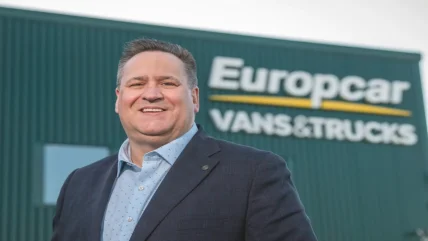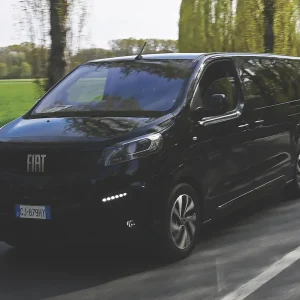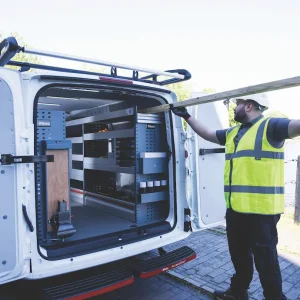
The semi-conductor crisis, which has dragged on for a year and may well continue into 2023, has put a serious dent in sales of new light commercial vehicles in a market that was already reeling from the production shutdowns triggered by the Covid-19 pandemic.
The squeeze on supply lines has inevitably impacted the leasing and rental sectors, so how have the leading players coped with such a challenging business climate?
Keith Shorter, director of rental giant Europcar Vans and Trucks, admits supply shortages have caused problems in sourcing new vehicles for the company’s fleet, but adds: “Thanks to [the] strong partnerships we have with many of the OEMs, we have been able to help businesses fill the gaps while they wait for new vehicles.”
In an indication of the blurring of lines between rental, which is often considered short term, and leasing, which traditionally caters for longer-term deals, Shorter says: “The Europcar Long-Term Van Rental solutions have given organisations the flexibility to maintain their own services with appropriately fitted and branded vehicles.”
He claims Europcar’s well-established partnerships with leading LCV manufacturers has enabled the firm to maintain supplies of new stock but adds it has extended its network of partners when it comes to sourcing alternative-fuelled vehicles.
“Earlier this year we brought a number of LEVC electric vans onto our fleet,” Shorter says.
“We are also working with other new brands entering the van market, news of which will be released before the end of the year.”
Leasing company Arval UK says almost 10% of its deliveries to customers this year have been electric vans, almost double the amount from the same period in 2021.
Shaun Sadlier, head of consulting at Arval UK, says: “The old brand hierarchies are changing in LCV fleets. We are working closely with new manufacturers to understand more about their product offerings so that our customers can get access to the vehicle they need, when they need it. These vehicles are not always from the traditional marques but they may offer shorter lead times and be more suitable for fleets wishing to electrify.”
Sadlier concedes the semi-conductor drought has caused lead times to lengthen – sometimes to 12 or 24 months, forcing the company to take measures to tackle disruption to its customers.
“Replacement cycles have extended through re-contracting, and we’re working closely with customers to help them assess their fleet and support reallocation of available vehicles to the most suitable driver, using telematics data and customer surveys,” Sadlier explains.
He points out that, for certain businesses, the lockdown period resulted in vehicles covering fewer miles and therefore being in a better position to re-contract for a longer period, rather than replace.
“We are also encouraging fleets and their drivers to plan ahead, order earlier and review their driver profiles to ensure the most suitable vehicles are in the right locations – for example, that electric vans are used on journeys into clean air zones,” he says.
“Our advice is that when a vehicle has been ordered, don’t cancel. Even if the original intention has changed, the order will result in a vehicle being delivered that can be reallocated to another driver, if needed.”
Northgate Vehicle Hire says: “With delays in new vehicle lead times, we have had to extend some vans beyond their predicted replacement cycles,
but we continue to receive new vehicle deliveries each week, just not as many as we would like.”
But the firm stresses that with a fleet of more than 50,000 light commercials it has been better able to manage supply shortages than most of its competitors.
Online van subscription service Myvandirect has also felt the effect of restricted supply, with CEO Duncan Chumley admitting it had not been able to put as many vans on its fleet as it had wished.
Chumley says Myvandirect has serviced its growing customer base by extending loans and holding vehicles longer on fleet.
In addition, he says: “Customers are more open to taking used vehicles due to current circumstances and this is positive for our business model.”
With customers using older vans, safety becomes more of an issue, but Chumley says this is something on which Myvandirect will not cut corners.
“We will never compromise on safety,” he insists.
“However, as vehicles get older, SMR costs increase and customers understand this.”
A further benefit to the firm caused by supply issues, according to Chumley, is that “companies have taken advantage of our flexible contracts to take vehicles on a short-term basis whilst their vehicles on order are delayed”.
Myvandirect offers van subscriptions running from one to 48 months, leading Chumley to claim: “Our customer offering is perfect in these current times.”
But like all vehicle hire businesses in a market where demand outstrips supply, Myvandirect has to cover paying rising prices for its stock and the buck tends to stop with the end customer.
“Rental prices ultimately have to reflect this (increased vehicle costs),” admits Chumley.
Arval’s Sadlier says the company is striving to keep down costs “where possible” and optimistically adds: “Vehicle production is now reported to be increasing, which will hopefully ease pressure in the vehicle supply chain in the future.”
Europcar’s Shorter says the business has adjusted its fleet policies to respond to the exceptional situation affecting vehicle supply this year.
“We have extended the average lifecycle for our vehicles, which in turn means more vans are requiring servicing and maintenance as well as MOTs – unheard of in previous years,” he explains.
SMR costs are predicted to be lower for electric vans and, as previously mentioned, interest in plug-ins in the leasing and rental sectors is on the rise. But Shorter cautions many businesses are still in the learning phase.
“They really need to understand what impact electric will have on their operations and productivity before they make wholesale changes to their fleet make-up” he says.
“There is a big difference between those companies who are doing lots of short runs, such as courier and local delivery companies and those who are transporting goods and people on longer motorway journeys, for example. How electric vans can be utilised in either scenario needs to be considered along with availability of charging points and the time it takes to recharge a vehicle.
That’s where our rental solutions are a good fit, giving businesses the opportunity to have a ‘real-world’ experience of electric vehicles that a short test drive simply can’t deliver.”
Chumley says Myvandirect is seeing demand for electric vans increase, but at a slower rate than demand for electric cars. Most interest is from last-mile operators, but he adds there is less demand from small businesses that still have range and charging infrastructure concerns.
Sadlier says that at the beginning of 2022, Arval advised fleets to plan ahead to make the switch to eLCVs and that today many had taken on plug-in vans in order to meet their decarbonisation goals.
“The impetus to adopt has not been deterred by the vehicle shortage situation,” claims Sadlier.
“Companies are aware it’s less of a quick switch than cars, but with a plan in place it’s achievable”
There remain obstacles on the road in terms of both supply shortages and electrification but it appears LCV leasing and rental companies are negotiating a path towards a brighter and greener future in 2023.
Downtime eliminator
Enterprise UK’s commercial vehicle rental division, Enterprise-Flex-E-Rent, has invested £1m in diagnostic and workshop equipment to reduce vehicle downtime.
The investment encompasses specialist tooling and direct system links to manufacturer partners as well as roller-brake testers and ancillary maintenance equipment such as tail-lift weight testing.
Enterprise Flex-E-Rent claims the new equipment boosts its in-house workshop capability by 30% across its 28 UK depots and says it will shift vehicle off-road time away from costly, unplanned, reactive maintenance towards scheduled maintenance, such as regular services.
James Walker, group service maintenance and repair manager at Enterprise Flex-E-Rent, says: “Managing vehicle downtime is that much harder since Covid, coupled with other macro-economic and supply chain issues.
“We are adapting and investing to keep pace with customer demand at a time when rental is becoming a core strategy, helping commercial operators ensure flexibility and quickly add or reduce capacity.”





